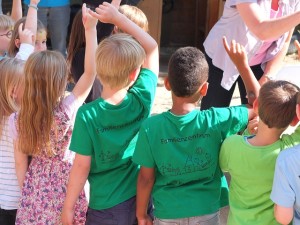
by Sue Palmer.
I’m a literacy specialist. Over the last forty years, along with battalions of other literacy specialists, I’ve earnestly researched the way children learn to read and helped devise teaching methods and materials for use in primary classrooms. You’d think that, with all this applied brain power, we’d have found ways to turn the majority of children into enthusiastic readers.
Unfortunately, we haven’t. As standardised testing proliferated in primary schools, we certainly got better at teaching children how to pass literacy tests – although, even in this limited field, quite a few still don’t make the grade. But sadly, in the twilight of my career, I’m forced to conclude that children’s chances of becoming fluent, committed readers are significantly lower than they were fifty years ago. Which is really worrying, because neuroscience now confirms that reading fluency is probably the single most important factor in overall educational success.
 Part of the problem is, of course, down to technological and cultural change. Today’s children have access to many amazing sources of information and entertainment – ways that involve minimal need for literacy skills – so there’s little motivation for them to settle down with a book.
Part of the problem is, of course, down to technological and cultural change. Today’s children have access to many amazing sources of information and entertainment – ways that involve minimal need for literacy skills – so there’s little motivation for them to settle down with a book.
And motivation is essential because it takes a lot of practice to achieve a level of reading fluency that makes it easy – and pleasurable – to read full-length texts. Unless children actually want to read, they’re unlikely to put in that effort. Endless lessons in ‘phonics’ and ‘comprehension’ won’t make them any keener.
In fact, the most motivated children are those who learn to read without much explicit teaching, as a result of pleasurable experiences before starting school. These are the ‘lucky’ children who:
- share loving interactions with their carers from the moment they’re born, including lots of songs and rhymes and stories
- enjoy plenty of opportunities for active, creative play with adult carers and, from the age of about three, with other children – as often as possible outdoors
- regularly share picture books with adults, thus discovering the pleasure of ‘a good read’
- aren’t pushed to read and write, just gently supported, at their own level, when they show an interest.
It’s not as if these ingredients of literacy luck are unknown. Indeed, the Scottish government has done a great deal to publicise them through its PlayTalk Read project for the parents of children under three. The trouble is that most parents are now out at work for most of the day and don’t have much time left over for playing, singing and sharing stories with their off-spring. And even the luckiest children don’t usually start reading by the age of four or five.
 This too has been widely known ever since schooling began. It’s why the Ancient Greeks didn’t send children to school till they were seven and why formal education in the vast majority of the world doesn’t start till at least six. It’s also why the European countries with the best record in terms of literacy today provide play-based kindergarten education for the under-sevens, with plenty of time for stories and song, as well as lots of opportunities for active, outdoor play. In a kindergarten, children who show an interest in reading and writing are supported at their own level but there’s no formal teaching till they start school. In fact, research has shown no long-term advantage in starting literacy instruction before the age of seven but plenty of potential for long-term damage – physical, emotional, social and cognitive.
This too has been widely known ever since schooling began. It’s why the Ancient Greeks didn’t send children to school till they were seven and why formal education in the vast majority of the world doesn’t start till at least six. It’s also why the European countries with the best record in terms of literacy today provide play-based kindergarten education for the under-sevens, with plenty of time for stories and song, as well as lots of opportunities for active, outdoor play. In a kindergarten, children who show an interest in reading and writing are supported at their own level but there’s no formal teaching till they start school. In fact, research has shown no long-term advantage in starting literacy instruction before the age of seven but plenty of potential for long-term damage – physical, emotional, social and cognitive.
The kindergarten approach is, of course, also highly beneficial in terms of physical and mental health – especially for twenty-first century children, who usually have limited opportunities for active, social, outdoor play during their early years. Play is children’s inborn learning drive, and the natural way to develop physical coordination and control, social skills, creativity, emotional resilience and a love of learning for its own sake.
So I’ve concluded that the best way to improve reading standards in Scottish schools – and thus to start closing that shameful attainment gap – is to stop obsessing about reading and writing during children’s early years. By introducing a kindergarten stage for three- to seven-year-olds, with the focus on nurture, play, health and well-being, Scotland could give all young children the best possible start in life, including the soundest possible foundations for reading and writing when formal education begins.
We know what makes children ‘lucky’ in terms of literacy – and of learning in general – so we should provide it for every one of them.
Sue Palmer is the author of many books on literacy and child development. Her latest – Upstart: the case for raising the school starting age and providing what the under-sevens really need (Floris Books, £9.99) – was published this summer.

